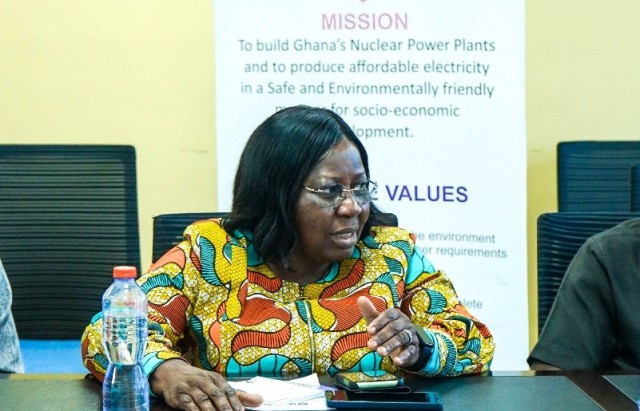Head of Public Affairs Department at Nuclear Power Ghana (NPG), Bellona-Gerard Vittor-Quao, has called for stronger collaboration, transparency, and ethical journalism in Ghana’s energy transition process.
Ghana’s shift toward renewable energy and critical minerals, she said, requires deeper involvement of communities and stakeholders to prevent future conflicts and ensure long-term national benefit.
Speaking at a Zoom engagement with members of Energy & Extractives Reporters Ghana (E.E REPORTERS GHANA), she noted that transparency is lacking, and decisions are not always aligned with the needs of the people who have the right to live on and depend on these lands.
Also read: GoldBod dismisses claims of GH¢3bn losses as false and misleading
“Stakeholder engagement is vital for responsible sourcing and for ensuring that extraction benefits the nation and protects the environment,” she said.
Energy transition
Bellona-Gerard, also an International Atomic Energy Agency (IAEA) expert on communication and stakeholder engagement, stressed that the global shift toward renewables has triggered a surge in demand for critical minerals, elements that Ghana possesses in significant quantities.
She questioned whether communities, especially those in mining zones, truly understand the impact of extracting these minerals, and whether they are being meaningfully included in decision-making.
“Are we carrying the people along? Do we fully understand how extraction affects their livelihoods, their environment, and their future?” he asked.
Ethical and high-value energy journalism
She urged journalists to elevate their reporting on the energy and extractives sector, arguing that the complexity of the transition demands specialized and ethical journalism.
According to her, beyond press releases and official statements, journalists must ask uncomfortable questions.
“Energy journalism must be high-value, high-impact, and holistic. Reporters must analyze trade-offs, balance economic and environmental interests, and hold institutions accountable,” she said.
Madam Bellona-Gerard challenged journalists to become a key oversight institution in the energy sector, given its centrality to climate change and national development. “The energy sector is at the heart of the climate crisis. Reporters must track Ghana’s transition from fossil fuels to renewables and expose gaps in implementation,” he added.
She emphasized collaboration between government, regulators, civil society, academia, project developers, and affected communities.
Global standards, she said, require engagement with all stakeholder groups to ensure balance and credibility, hence the need to create platforms for diverse voices, especially marginalized groups, and counter dominant narratives that ignore local realities.”
She added that proper engagement can help identify issues early, highlight risks, and build social trust.
Human and environmental costs
Ms Vittor-Quao called for rigorous environmental impact assessments, land remediation plans, and equitable distribution of resource wealth.
She emphasized the need to focus on the human and environmental costs.
“Without addressing these, Ghana’s energy transition will not be sustainable,” she stressed.
She encouraged journalists to investigate environmental degradation, compensation processes, resettlement challenges, and the long-term viability of extractive projects. And reminded journalists of their responsibility to ensure accountability and strengthen public participation in Ghana’s energy transition.
The media, she said, must remain ethical, transparent, and people-centred in its reporting and help shape a transition that serves all Ghanaians.


